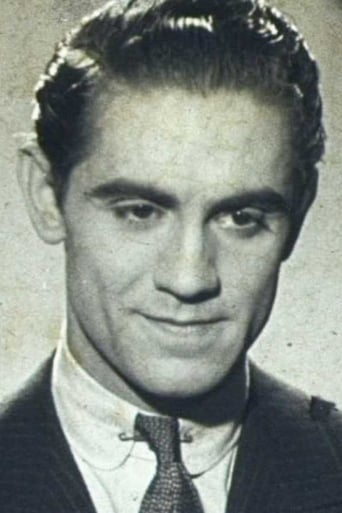Protraph
Lack of good storyline.
Matialth
Good concept, poorly executed.
Nicole
I enjoyed watching this film and would recommend other to give it a try , (as I am) but this movie, although enjoyable to watch due to the better than average acting fails to add anything new to its storyline that is all too familiar to these types of movies.
Phillipa
Strong acting helps the film overcome an uncertain premise and create characters that hold our attention absolutely.
lonchaney20
While writer/director Eloy de la Iglesia is well known in Spain for his quinqui (i.e. hoodlum) films, gritty depictions of young criminals and drug addicts, abroad his reputation rests largely on the shoulders of his early seventies thrillers. The most notorious of these is Cannibal Man, which gained cinematic immortality as one of Britain's Video Nasties. Like many titles on that list, this film is far more complex than its exploitative title and marketing would suggest; the original Spanish title is La semana del asesino, which means The Week of the Murderer.The murderer in this case, rather than "cannibal man" as the export title misleadingly suggests. is Marcos (Vicente Parra), a lower-class employee of the local slaughterhouse. His small shack looks like a relic when compare to the adjacent high-rise apartment, which is populated largely by affluent students. Marcos is pressured by his girlfriend Paula (Emma Cohen, one of Spain's greatest actresses) to marry, but he insists on waiting until he's promoted. One of their outings goes horribly wrong when a cab-driver, disturbed by their backseat necking, kicks them out of his taxi. Marcos refuses to pay the fare, and a scuffle breaks out. As the cab driver begins beating Paula, he utters one of the film's best lines, which is simultaneously hilarious and tinged with social commentary: "I'm gonna give you the beating your father never had time to give you!" Marcos hits him in the head with a rock, accidentally ending his life. Thus begins our protagonist's soul-destroying week, which finds him committing murder after murder in order to cover up his original crime.Though the film has its share of blood and gore, Eloy de la Iglesia is far more interested in his character's plight, as well as his social status. Marcos often reminds us that he's a poor man. When his brother and girlfriend pressure him to confess his crimes to the police, he protests that as a working class schmo he'd never get a fair trial. "The police will never believe me...and you need money to afford a good lawyer." The chain of murders only escalates as more people snoop in Marcos' shack, and react either with hostility or fear. His only friend throughout the whole ordeal is the enigmatic Nestor (Eusebio Poncela, most famous for playing the inspector in Almodovar's Matador). Nestor is a resident of the nearby high-rise, and one of the affluent students mentioned earlier. He spends his time spying on people with his binoculars, and this is how he acquaints himself with Marcos.In discussing the relationship between Marcos and Nestor, it is necessary to reference the director's sexual orientation. Eloy de la Iglesia was a gay Marxist, during a time in which homosexuality was still illegal in Spain. Though it's never blatantly mentioned, Nestor is clearly gay, and he shares the director's sympathy with the working class. Though he initially tries to impress Marcos with masculine posturing, Nestor's interactions with Marcos soon become charged with homo-eroticism. This reaches its peak in a memorable swimming pool scene, in which Marcos and Nestor swim and shower together; it's a dazzling and tender display of filmmaking, and it loses not of its potency with repeat viewings. This scene, as well as much of the political content, was unfortunately but not surprisingly censored from the Spanish version of the film, meaning that this English-dubbed export version is the closest thing to a true director's cut. Some recently discovered deleted scenes, featured on the German blu-ray, fascinatingly hint at a more explicit version. While most of the material is inessential, such as a scene in which Marcos is promoted, one of the final scenes shows Nester and Marcos passionately making out. No context is provided, and this scenes (as well as the others) features no audio. Thus this plays as a haunting footnote to the film's fascinating and complex central relationship: did de la Iglesia intend for the two men to become lovers? Is this perhaps just a fantasy of Nestor's? Or, more intriguingly, a fantasy of the classically masculine Marcos? Unless the screenplay surfaces, or someone interviews Poncela about it, we may never know.Since I am both a huge fan of this film and incredibly reckless with my money, I forked out a sizable amount of money to import the recent German blu-ray. I am pleased to say that the disc is a significant upgrade to the American DVD, and lends a greater appreciation to the director's artistry. This was my third viewing of the film, and I found it just as rewarding as the first. The surprise reveal in the deleted scenes only sweetened the deal for me, assuring me that my money was well spent. It is a complex, politically charged, yet deeply heartfelt film. I shared it with a friend on my last viewing, and I hope he will not mind if I share his thoughts on the experience: "It's really just about one man having a bad week, and the trials of having to get through it without losing his whole soul." It is that, but also much more; a film that can be appreciated from multiple perspectives. I fear that this review does not do it justice. Suffice it to say that this is truly one of the crowning achievements of Spanish horror cinema. This will also be of interest to anyone interested in the history of queer cinema, being one of the ballsiest acts of transgression ever committed under a fascist dictatorship. Though homosexuality was outlawed in Spain, de la Iglesia wore his sexuality like a badge of honor, and he continued to make films on his own terms.
fertilecelluloid
Eloy de la Iglesia's "Cannibal Man" is an exceptional study of sociopathic isolation that also comments on the gulf between how the rich and poor were treated by the authorities in Spain in '72. Vicente Parra is Marcus, a slaughterhouse worker who accidentally kills a taxi driver. Convinced that the police will not believe his account of the incident, he refuses to turn himself in. His girlfriend has other ideas and wants him to go to the police (her social status is higher than his). When she refuses to understand his position, he is left with little option but to kill her. Thus begins a chain of bloody murders as Marcus is threatened with exposure by his friends, family members, and colleagues. Eusebio Poncola, who starred in the brilliant Spanish detective series, "The Adventures of Pepe Carvahlo", plays Nestor, a wealthy local who introduces himself to Marcus. Though subtly conveyed by Iglesia, Nestor's interest in Marcus extends beyond friendship. A surreal pool scene, in which the men become entangled in the water, perfectly communicates unspoken ambitions. It turns out that the affluent Nestor is, ironically, Marcus's only potential ally in his descent into depression and madness, but his offer of help may come too late. Similar in tone to "Henry - Portrait of a Serial Killer", this is a well written, thinking man's thriller that doesn't blush at its atrocities. The film is full of magnificent, clever details. For example, Marcus is slow to rid himself of the corpses piling up in his bedroom, so the place has started to reek. Iglesias conveys the situation with wonderful black humor by showing us packs of dogs loitering at his front door for a taste of the rotten meat inside. Every night Marcus arrives home, he has to scream at the dogs as they swarm about like flies. During one of the murder scenes, the director intercuts a game of soccer going on outside. Much more than a standard horror flick, this touches on the perils of becoming more successful than your friends and the consequences of tough decisions. We sympathize with Marcus's situation, even though his actions are illegal. Putting a cherry on top of the cake is a minimalist score and creepy, electronic sound effects. Unfortunately, most versions available (including the one I saw) are dubbed. I'd kill to see this in its original language.
The_Void
Contrary to what it's title suggests, Cannibal Man has nothing to do with cannibals or people being eaten; it's more a story about insanity in the mould of the 80's classic Henry: Portrait of a Serial Killer, only the blame is deflected onto society rather than the character himself. Despite not being about cannibals, the movie features more than enough blood and the opening scene, which takes place in an abattoir, will adequately set most audience members up for what is to follow. What follows is a rampage of violence, as our character slips deeper into insanity and kills the people around him. It all starts with the (sort of) accidental death of a taxi driver. After that, our hero kills his girlfriend for fear that she might tell the police, and follows that murder up with his brother's, his brother's girlfriend's etc etc. This chain of murders could become rather dull, but the relaxed tone of the film and the way that we always focus on the escapades of the central character throughout his decent into insanity ensures that the film never turns into a riotous slash-fest.Aside from the fact that Franco was in power, I really don't know anything about Spain at the time that this was made. Cannibal Man reflects life in the country at the time, but to be honest; whatever social study there is really gets lost under the murders and putrid atmosphere of the film. Rather than looking for social comments, I recommend viewing this film more as a look at insanity, as it can be enjoyed much easier that way. If looked at as an insight into insanity; Cannibal Man is a rather potent film, which shows insanity doesn't have to be something that a murderer is born with. The atmosphere that director Eloy de la Iglesia has created is fabulous. The film feels rotten, like a slab of meat left out at the abattoir, and this helps to ensure that we always view our central character's plight with disgust and regret, rather than simply enjoying the killings. Many of the murders in the film are standard stuff, with the exception of one great one that sees a thrown hatchet lodged in some poor guy's face! On the whole, despite the homoerotic tone towards the end; Cannibal Man is cleverer than it looks and even if viewed without intelligence - the film can be enjoyed.
Coventry
I still haven't quite figured out what really to think of this film…By no means it's a mind-blowing thriller or even a memorable eurohorror entry. The film moves by slow and careful…and the plot-development is too tame to keep your solid attention. Heck, even the sex-sequence is shot in a dreadfully tedious way. Yet, do not underestimate this production too much and – whatever you do – don't be misled by the title that has a traitorous splatter ring to it! Even though `Cannibal Man' does contain a couple of nasty butchering sequences, it merely is drama and an alarming social portrait. Marcos is a simple man, living on the edge of poverty. He works in a slaughterhouse and has a younger girlfriend. After a night out, Marcus gets into a fight with an unfriendly cabdriver. He accidentally kills him leaves the place of the crime. The girl wants Marcus to confess what he did to the police but Marcus doesn't want this and sees no other option than to kill her too, before she talks. Later, he kills his brother for not being supportive about it, then his sister-in-law for becoming suspicious etc etc etc… You get the picture: Marcus descents further and further into madness!
I guess the controversial value is the most remarkable thing about `Cannibal Man'. Director Eloy de la Iglesia (not-so) subtly criticizes society's lack of communication, solidarity and the entire authority & justice system! Bearing in mind the film was made during the reign of the Spanish dictator Franco, this was a risky operation to say the least.







